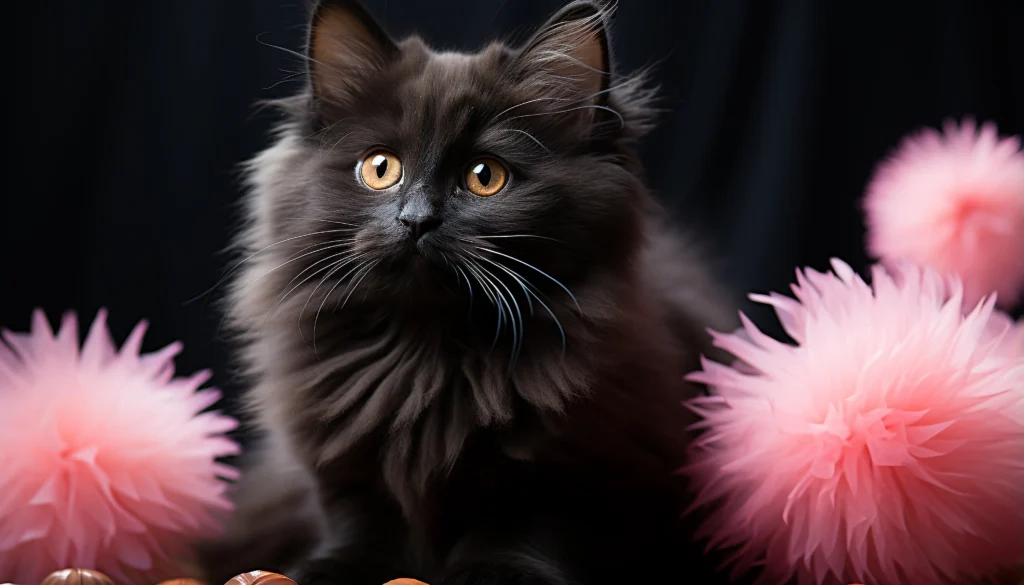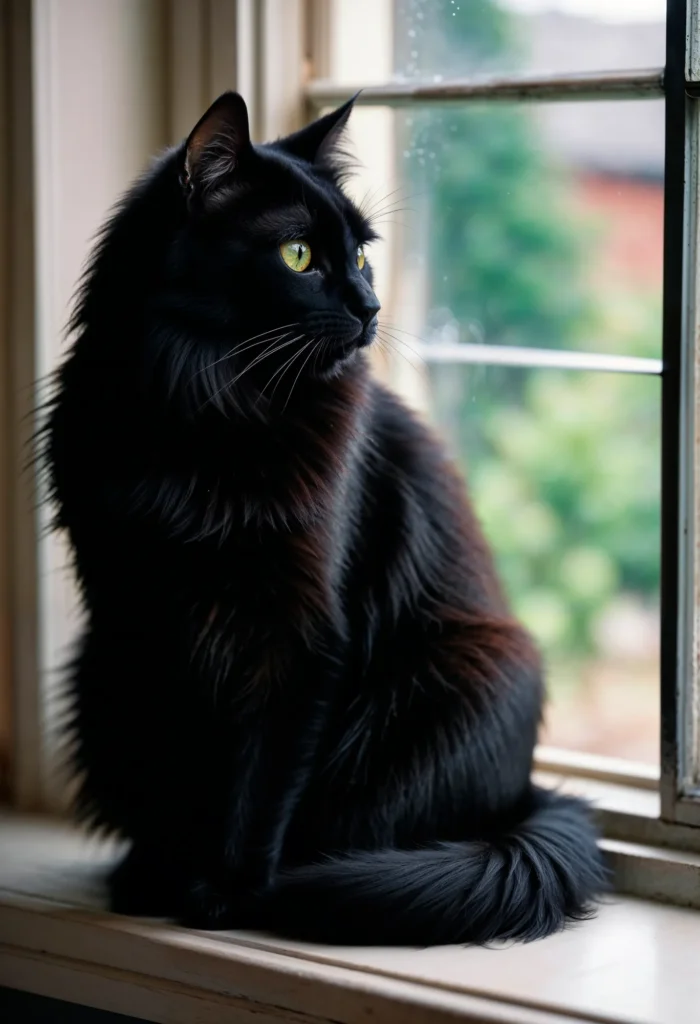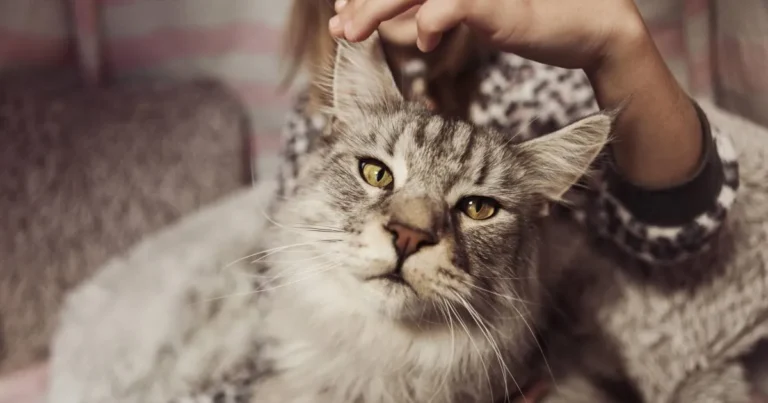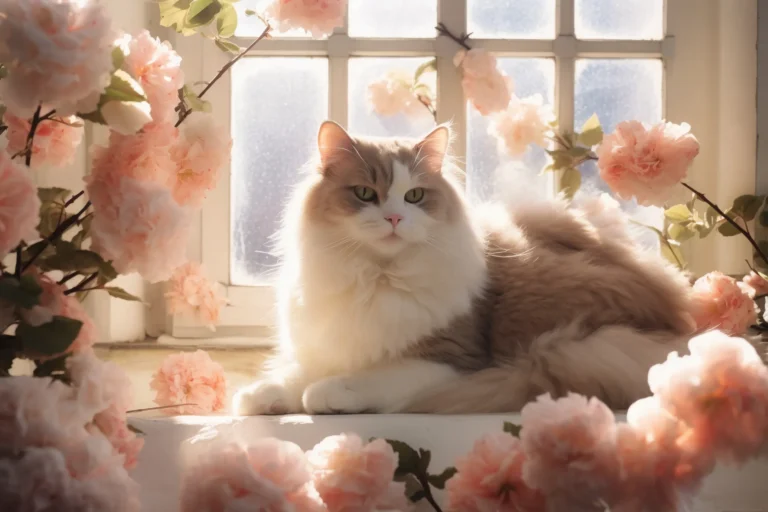Introduction: The Enchanting World of Long Haired Black Cats
Long Haired Black Cats :
When it comes to feline companions, few are as striking and captivating as long haired black cats. These mysterious creatures have been the subject of fascination, superstition, and adoration for centuries. With their luxurious ebony coats and piercing eyes, long haired black cats combine elegance with an air of mystery that’s simply irresistible.
Whether you’re considering adding a new furry friend to your family or simply curious about these magnificent creatures, this comprehensive guide will introduce you to seven stunning long-haired black cat breeds that deserve your attention. From the regal Persian to the wild-looking Maine Coon, these beautiful black beauties offer unique personalities and characteristics that make them exceptional companions.
Far too often, long haired black cats are overlooked in shelters and catteries due to outdated superstitions or simple misunderstanding of their true nature. By the end of this article, you’ll discover why passing up the opportunity to welcome one of these enchanting creatures into your home would be a decision you might truly regret.
Let’s dive into the captivating world of long haired black cats and explore what makes them so special!
Why Long Haired Black Cats Deserve Your Attention
Before we explore specific breeds, it’s worth understanding what makes long haired black cats so unique. The combination of luxurious, flowing fur and a solid black coat creates a stunning visual effect that’s simply unmatched in the feline world.
Long haired black cats possess a natural elegance that turns heads. Their sleek, midnight-colored coats shimmer in the light, giving them an almost otherworldly appearance. The contrast between their dark fur and bright, expressive eyes (often gold, green, or copper) creates a mesmerizing effect that cat lovers find irresistible.
Beyond their striking appearance, long haired black cats often have wonderful personalities. Many owners report that their black cats are particularly affectionate, intelligent, and playful. While each cat is an individual, black cats as a whole have a reputation for being especially loving companions.
Now, let’s explore seven magnificent long haired black cat breeds that you’ll regret overlooking!
1. The Regal Black Persian Cat

The Persian cat is perhaps the most recognizable long haired cat breed in the world, and black Persians are particularly stunning. With their luxuriously thick coats, squished faces, and round, expressive eyes, black Persian cats embody feline royalty.
Characteristics of Black Persian Cats
Black Persian cats feature:
- Ultra-long, silky fur that requires daily grooming
- A distinctive flat face with short nose
- Large, round eyes that often come in copper or gold
- A stocky, medium-sized body with short legs
- A sweet, docile temperament
Personality Traits
The black Persian cat is known for its gentle, calm disposition. These cats are typically quiet and undemanding, preferring a peaceful environment where they can lounge regally on comfortable surfaces. While not particularly active, they form strong bonds with their owners and enjoy gentle affection.
Black Persian cats are perfect companions for those seeking a low-energy pet who radiates sophistication and grace. Their quiet nature makes them ideal for apartments or homes where noise might be an issue.
Care Requirements
Owning a black Persian cat comes with significant grooming responsibilities. Their long, dense coat requires daily brushing to prevent matting and reduce hairballs. Regular eye cleaning is also necessary due to their facial structure. While demanding in terms of grooming, the black Persian cat rewards its owner with unparalleled elegance and quiet companionship.
2. The Majestic Black Maine Coon

The Maine Coon is America’s native long haired cat breed, and black Maine Coons are particularly impressive specimens. Known for their substantial size, tufted ears, and bushy tails, black Maine Coon cats combine wild looks with friendly personalities.
Characteristics of Black Maine Coon Cats
Black Maine Coon cats feature:
- A large, muscular body (males can weigh 15-25 pounds)
- Medium to long fur with a waterproof undercoat
- Distinctive tufted ears and lynx-like ear tufts
- A bushy, raccoon-like tail
- Large, expressive eyes (often gold or green)
Personality Traits
Despite their somewhat wild appearance, black Maine Coon cats are known as “gentle giants.” They’re typically friendly, outgoing, and playful well into adulthood. These cats often show dog-like traits, such as playing fetch, walking on leashes, and greeting their owners at the door.
Black Maine Coon cats are highly intelligent and enjoy interactive play. They’re typically good with children and other pets, making them excellent family companions. Their vocal nature means they’ll “talk” to their owners with distinctive chirps and trills rather than standard meows.
Care Requirements
While their semi-long fur doesn’t mat as easily as a Persian’s, black Maine Coon cats still require regular grooming—typically twice weekly. Their large size means they need space to move and climb, so providing cat trees and play areas is important. These cats are generally hardy but may be prone to certain genetic conditions like hypertrophic cardiomyopathy, so regular veterinary check-ups are essential.
The Norwegian Forest cat, or “Wegie,” is a natural breed from Northern Europe with a fairy-tale history. Black Norwegian Forest cats are particularly striking, with their triangular faces, almond-shaped eyes, and weatherproof double coats.
Characteristics of Black Norwegian Forest Cats
Black Norwegian Forest cats feature:
- A sturdy, muscular body with long legs
- A double coat with a woolly undercoat and water-repellent overcoat
- A long, bushy tail
- Tufted ears and tufts of fur between their toes
- Almond-shaped eyes, often green or gold
Personality Traits
Black Norwegian Forest cats are known for their friendly, independent nature. They’re active and playful but not overly demanding of attention. These cats enjoy climbing and observing their surroundings from high perches, reflecting their forest-dwelling ancestry.
While affectionate with their families, Norwegian Forest cats aren’t typically lap cats. They prefer to be near their humans rather than on them. Their intelligence and curious nature make them excellent problem-solvers who enjoy interactive toys and puzzles.
Care Requirements
Despite their long fur, black Norwegian Forest cats are relatively low-maintenance. Their naturally oily coat resists matting, though weekly brushing is still recommended to remove loose fur and prevent hairballs. These cats are generally healthy and robust, though they may be prone to certain genetic issues like glycogen storage disease.
The Mysterious Black Siberian Cat
The Siberian cat is Russia’s national cat, developed naturally in the cold forests of Siberia. Black Siberian cats are particularly breathtaking, with their thick, water-resistant coats and powerful bodies.
Characteristics of Black Siberian Cats
Black Siberian cats feature:
- A medium to large muscular body
- A triple coat that’s thicker in winter
- A rounded face with full whisker pads
- Moderately large, slightly rounded ears
- Expressive eyes that are typically gold or green
Personality Traits
Black Siberian cats are known for their playful, affectionate personalities. They form strong bonds with their humans and often follow them from room to room. Despite their size and power, they’re typically gentle and patient with children.
Siberian cats are highly intelligent and maintain their kitten-like playfulness well into adulthood. They enjoy interactive play and are often fascinated by water—some will even join their owners in the shower or play in water bowls.
Care Requirements
Black Siberian cats have a thick triple coat that requires regular brushing, especially during seasonal shedding periods. Despite their long fur, they produce less of the Fel d 1 protein that causes allergies, making them potentially suitable for some allergy sufferers. They’re generally healthy and robust, with a lifespan of 12-15 years.
3. The Elegant Black Ragamuffin

The Ragamuffin is related to the Ragdoll breed but comes in a wider variety of colors and patterns. Black Ragamuffins are particularly striking, with their luxurious coats and teddy bear-like appearance.
Characteristics of Black Ragamuffin Cats
Black Ragamuffin cats feature:
- A large, muscular body with substantial bone structure
- Semi-long, plush fur that’s silky to the touch
- A broad, modified wedge-shaped head
- Large, walnut-shaped eyes (often gold or copper in black cats)
- A bushy tail with longer fur forming a slight plume
Personality Traits
Black Ragamuffin cats are known for their exceptionally sweet and docile temperaments. They’re often described as “puppy-like” due to their tendency to follow their owners around and even come when called. These cats typically love being held and will often go limp in your arms, much like their Ragdoll cousins.
Ragamuffins are particularly good with children and other pets, making them excellent family cats. They’re intelligent but not overly demanding, content to simply be near their humans rather than requiring constant interaction.
Care Requirements
The plush coat of a black Ragamuffin requires regular grooming—typically twice weekly—to prevent matting and reduce hairballs. These cats are generally healthy, though they may be prone to some of the same genetic issues as Ragdolls, such as hypertrophic cardiomyopathy.
4. The Exotic Black Chantilly-Tiffany
The Chantilly-Tiffany (sometimes simply called the Chantilly or Tiffany) is a relatively rare breed known for its semi-long silky coat and golden eyes. Black Chantilly-Tiffanies are particularly stunning, with their flowing coats and characteristic amber eyes.
Characteristics of Black Chantilly-Tiffany Cats
Black Chantilly-Tiffany cats feature:
- A medium-sized, semi-foreign body type
- Semi-long, silky fur without an undercoat
- A modified wedge-shaped head with full cheeks
- Large, expressive eyes that are typically gold or amber
- A plumed tail and ruff around the neck
Personality Traits
Black Chantilly-Tiffany cats are known for their gentle, quiet personalities. They’re typically less vocal than many other breeds but communicate with soft chirps and trills when they do speak. These cats form strong bonds with their humans and are often described as devoted companions.
Chantilly-Tiffanies are moderately active and playful but not hyperactive. They enjoy interactive play and are intelligent enough to learn tricks and commands. They’re typically good with children and other pets when properly socialized.
Care Requirements
The silky coat of a black Chantilly-Tiffany is relatively easy to maintain, requiring brushing once or twice a week to prevent tangling. Since they lack an undercoat, they shed less than many other long-haired breeds. These cats are generally healthy, though the breed’s rarity means less is known about potential genetic issues.
5. The Bewitching Black Nebelung
While Nebelungs are typically known for their blue (gray) coats, black Nebelungs do exist and are particularly striking. With their slender bodies and silky, medium-length fur, black Nebelungs have an air of mystery and elegance.
Characteristics of Black Nebelung Cats
Black Nebelung cats feature:
- A long, slender, muscular body
- Medium-length silky fur that’s longer on the tail
- A modified wedge-shaped head with high cheekbones
- Large, almond-shaped eyes (typically green)
- Large ears set wide apart
Personality Traits
Black Nebelung cats are known for their gentle, somewhat reserved personalities. They typically form strong bonds with one or two people rather than being outgoing with everyone. These cats are intelligent and observant, often watching and analyzing situations before getting involved.
Nebelungs are moderately active and enjoy interactive play. They’re typically good with children and other pets when properly socialized, though they may be shy around strangers. Their loyalty and affectionate nature make them wonderful companions for those who appreciate a more thoughtful, less demanding cat.
Care Requirements
The silky coat of a black Nebelung requires regular but not excessive grooming—typically once or twice a week. These cats are generally healthy and can live 15-18 years with proper care. They appreciate having vertical space to climb and observe their surroundings.
Understanding Black Cat Personality: Beyond the Myths
When discussing long haired black cats, it’s impossible to ignore the many myths and misconceptions surrounding black cats in general. Despite centuries of superstition, the truth is that black cat personality traits are as varied and individual as those of cats of any other color.
Many owners of black cats report that their feline companions are especially affectionate, intelligent, and playful. Some even suggest that black cats seem to have a special understanding of human emotions, often appearing when their owners are sad or distressed.
Research has not found any correlation between coat color and personality in cats. A cat’s temperament is influenced by factors such as:
- Genetics
- Early socialization
- Individual experiences
- The specific breed (as discussed above)
What does seem to be true is that black cats often develop especially close bonds with their owners, perhaps because they’re sometimes overlooked by others. When given the chance, a long-haired black cat can be an exceptionally loving and loyal companion.
Dispelling Black Cat Superstitions
Throughout history, black cats have been surrounded by superstition and myth. In some cultures, they’re considered lucky, while in others, they’re associated with bad luck or witchcraft. These black cat superstitions have unfortunately led to lower adoption rates for black cats in shelters.
The truth is that black cats are simply cats with a particular coat color, no more mysterious or magical than cats of any other color. In fact, in many cultures, black cats are considered symbols of good fortune:
- In Japan, black cats are thought to bring good luck to their owners
- British sailors historically considered black cats lucky on ships
- In Celtic mythology, a fairy known as the Cat Sìth sometimes took the form of a black cat and was not considered malevolent
Modern science has discovered that the gene responsible for black fur may offer some health benefits, potentially providing increased resistance to certain diseases. Far from being unlucky, black cats might actually be genetically fortunate!
Black Cat Adoption: Why You Should Consider It
If you’re considering adding a feline friend to your family, there are compelling reasons to consider black cat adoption:
- You’ll be saving a life: Black cats typically wait longer to be adopted from shelters and have higher euthanasia rates.
- You’ll get a gorgeous companion: Long haired black cats are particularly striking, with their glossy coats and expressive eyes.
- You’ll be fighting superstition: By adopting a black cat, you’re taking a stand against outdated myths and misconceptions.
- You’ll be getting a healthy cat: The gene for black fur has been linked to stronger immune systems in some studies.
- You’ll have a mini-panther in your home: Many black cat owners love the resemblance their pets bear to majestic wild cats.
When adopting a long-haired black cat, take time to meet several cats to find one whose personality matches your lifestyle. Remember that within any color or breed, individual personalities vary widely.
Choosing the Perfect Black Cat Names
Naming your new long-haired black cat is one of the joys of adoption. Many owners choose names that reflect their cat’s mysterious appearance or the rich mythology surrounding black cats. Popular black cat names include:
- Mythological names: Luna, Nyx, Osiris, Freya
- Literary names: Salem, Binx, Bagheera, Shadow
- Mystical names: Magic, Mystic, Raven, Onyx
- Cosmic names: Nova, Nebula, Galaxy, Comet
- Gothic names: Morticia, Gomez, Wednesday, Raven
Whatever name you choose, make sure it’s one you enjoy saying, as you’ll be using it daily. Some owners find that their cat’s personality suggests the perfect name after they’ve spent some time together.
Essential Black Cat Care Tips
Caring for a long-haired black cat requires some special considerations:
Grooming Requirements
Long haired black cats require regular grooming to keep their coats healthy and reduce hairballs. Depending on the specific breed and coat type, you may need to brush your cat daily or several times a week. Black fur shows dandruff more visibly, so maintaining skin health through proper nutrition is important.
Health Considerations
Black cats have the same general health needs as cats of other colors. Regular veterinary check-ups, vaccinations, and preventative care are essential. Some studies suggest that the gene for black fur may provide some health advantages, but this doesn’t replace proper veterinary care.
Diet and Nutrition
A high-quality diet appropriate for your cat’s age, size, and activity level is essential. Long-haired cats may benefit from specialized hairball-control formulas. Always provide fresh water and monitor your cat’s weight to prevent obesity.
Environmental Enrichment
All cats, including long haired black cats, need environmental enrichment. Provide scratching posts, climbing trees, toys, and interactive play sessions to keep your cat physically and mentally stimulated.
Black Cat Grooming: Maintaining That Lustrous Coat
The defining feature of long haired black cats is, of course, their magnificent coat. Proper grooming is essential to keep it healthy and beautiful:
Brushing Techniques
Different coat types require different brushing techniques:
- For silky coats (like Nebelungs), a wide-toothed comb followed by a soft brush works well
- For thick double coats (like Maine Coons), a slicker brush followed by a steel comb is effective
- For triple coats (like Siberians), special de-shedding tools may be necessary during seasonal shedding
Regular brushing not only prevents mats but also distributes natural oils through the coat, keeping it glossy and healthy.
Bathing Considerations
Most long haired black cats rarely need baths unless they get into something messy. When bathing is necessary, use a cat-specific shampoo that won’t strip the natural oils from their coat. Black cats may benefit from special shampoos designed to enhance dark coats.
Dealing with Shedding
All long-haired cats shed, but the amount varies by breed. Regular brushing significantly reduces the amount of loose fur in your home. During seasonal shedding periods, more frequent brushing may be necessary.
Black Cat Lifespan and Health Issues
With proper care, long haired black cats typically live 12-15 years, with some reaching 20 or more. While black cats don’t have specific health issues related to their color, certain long-haired breeds may be prone to specific conditions:
- Persian cats may have breathing difficulties due to their flat faces
- Maine Coons and Ragamuffins may be prone to hypertrophic cardiomyopathy
- Norwegian Forest cats may have genetic issues like glycogen storage disease
Regular veterinary check-ups, preventative care, and prompt attention to any health changes can help ensure your long-haired black cat lives a long, healthy life.
Conclusion: Why You Won’t Regret Adopting a Long-Haired Black Cat
Long haired black cats combine striking beauty with loving personalities. Whether you choose a specific breed like the Persian, Maine Coon, Norwegian Forest cat, or Siberian, or adopt a magnificent mixed-breed long-haired black cat from a shelter, you’re sure to gain a devoted companion.
These mysterious felines offer:
- Unparalleled beauty with their flowing ebony coats
- Diverse personalities to match any lifestyle
- The opportunity to dispel harmful superstitions
- Years of loyal companionship
By opening your heart and home to a long-haired black cat, you’ll not only gain a loving friend but also experience the special bond that comes from giving a sometimes-overlooked cat the chance to shine. The only regret you’re likely to have is not adopting one sooner!
FAQs About Long Haired Black Cats
Q: Are long haired black cats more difficult to care for than other cats? A: They require regular grooming to maintain their coats, but otherwise have similar care needs to other cats. The specific amount of grooming depends on the breed and individual coat type.
Q: Do black cats have special personalities? A: While many owners report that their black cats are especially affectionate and intelligent, there’s no scientific evidence linking coat color to personality. Each cat is an individual with its own unique temperament.
Q: Are black cats really less likely to be adopted? A: Unfortunately, yes. Statistics show that black cats typically wait longer to be adopted from shelters and have higher euthanasia rates than cats of other colors.
Q: Is it true that black cats bring bad luck? A: No, this is just a superstition with no basis in reality. In many cultures, black cats are actually considered lucky!
Q: Do long haired black cats shed a lot? A: All long-haired cats shed, but the amount varies by breed. Regular brushing significantly reduces shedding and helps prevent hairballs.
Q: Are black cats more likely to have health problems? A: No, black cats are not more prone to health issues than cats of other colors. In fact, some research suggests the gene for black fur may offer some health advantages.
Q: What’s the best long-haired black cat breed for families with children? A: Maine Coons, Ragamuffins, and Siberians are known for being particularly good with children, but individual personality varies within any breed.
Resources:





Leave a Comment